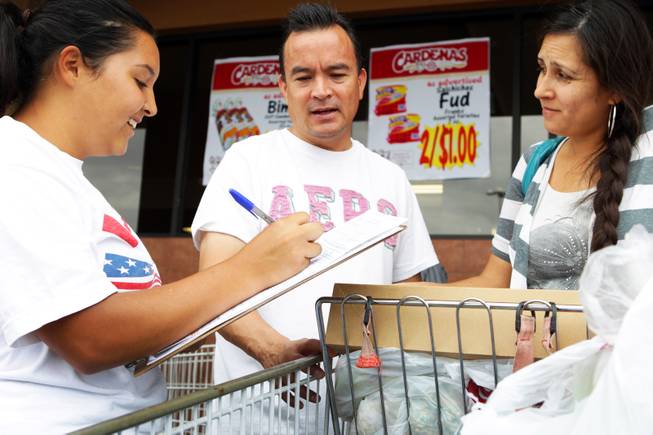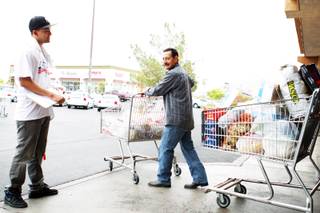
Linda Rios, from left, 20, a canvasser for Mi Familia Vota, a nonpartisan civic organization, helps Alfonso Pereyra register to vote as his wife, Maribel Para, looks on outside of a grocery store in Las Vegas on Tuesday, July 31, 2012.
Saturday, Aug. 4, 2012 | 2 a.m.
While candidates for office have a big red circle targeting Nov. 6 on their calendars, Southern Nevada organizations working to increase voter participation, especially among minorities, have a different date in their sights, Oct. 6, the last day of voter registration.
A coalition of Hispanic community groups met Thursday to coordinate efforts, both to register voters and to ensure they are motivated and able to get to the polls in November.
The Service Employees International Union has been heavily involved in voter registration efforts for years and has targeted specific campaigns at Hispanics. Eliseo Medina, SEIU secretary-treasurer, was in town as part of the union’s “¡Todos a Votar!” (Let’s all Vote!) campaign, which started in California and will visit Arizona, Florida, Colorado and Texas.
He spoke to about 70 people gathered at the Rafael Rivera Community Center to organize the final voter mobilization push before the deadline.
Participating groups include Mi Familia Vota, which was founded by SEIU and acts as an independent civic engagement organization, National Council of La Raza, Episcopalian Coalition, Nevada Child Seekers and DREAM Big Vegas, an advocacy group for Dream Act-eligible youths.
“I was here six years ago doing organizing work, and I don’t think this was possible then,” Medina said. “The organizations were all competing for the allegiance of the community, and you never would have gotten them all together in the same room singing from the same song book. Now there is consensus among the community groups here in Las Vegas, and there is coordination and collaboration.”
The event also kicked off Mi Familia Vota’s door-to-door canvassing this election season. Medina and others walked through the neighborhood just east of downtown near Mojave Road and Stewart Avenue, knocking on doors and talking with prospective voters. If the residents already were registered, canvassers asked them to sign a pledge to vote Nov. 6.
Since late February, Mi Familia Vota has been stationing workers at grocery stores, plazas, Department of Motor Vehicles locations and other public places to register voters and make sure already-registered voters have their current information on file.
On Tuesday, Mi Familia Vota’s Linda Rios stood outside a Cardenas supermarket imparting the group’s message that this election, with potential ramifications on economic, health care, education and immigration policy, is too important to sit out.
She snagged Alfonso Pereya on his way out of the store.
“I think it’s important for the Latino voice to be heard,” said Pereya, who became a citizen six years ago after migrating from Mexico. “If you want to see change, you have to participate. You can’t sit there and complain about the economy and then not do anything.”
According to Mi Familia Vota, the group has registered more than 9,500 people in Clark County.
Hundreds of thousands of Hispanics are turning 18 every year, and they are a focus for Mi Familia Vota.
Miguel Esparza works for Mi Familia Vota and will turn 18 just in time to vote in the upcoming election.
“I wouldn’t say I was super politically involved before this year,” he said. “But I’ve learned a lot while working here. I’ve become more informed in general. Also, when I’m out here and I meet people who want to vote but can’t for whatever reason, that really showed me that I have to appreciate the fact that I can vote.”
The National Council of La Raza also has voter registration teams on the ground in key states, including Nevada.
Since March those teams have registered more than 3,200 people in Nevada, said Cinthia Zermeño, NCLR’s Nevada field team manager.
“We try to explain the process to people and make sure they feel comfortable with what to do on Election Day,” Zermeño said. “We want them to know they have the power to make a difference. We also emphasize not only the national election but the local elections, as well. It’s not just the White House, it’s also about having a say in who represents us in Carson City and locally.”
NCLR also had town-hall meetings on clean energy and the foreclosure crisis as part of its efforts to spur civic engagement and share information.
Hispanics are the largest minority voting bloc in the Silver State, about 25 percent of the population, but organizations are reaching out to other underrepresented groups as well, including blacks, Chinese and Filipinos.
Filipinos are the largest Asian population in Nevada, making up 3.6 percent of the population, and the first Southern Nevada Filipino civic engagement group, Filipino American Political Organization with Equal Representation, launched this year.
Every Saturday, a team is at Seafood City in central Las Vegas, registering voters. The grocery is popular with Filipinos and houses a branch of the Philippine National Bank.
Cynthia Deriquito, board director of the Filipino-American Political Organization With Equal Representation, said she had noticed local politicians paying more attention to the Filipino community as new demographic data have come out and the community group started to rally voters.
“People are coming to us to get involved,” Deriquito said. “They see us registering people and come over to get information. Some of them said they have been citizens for 10 or 15 years and are just not registering. I think as we become more organized and people notice our numbers they are saying ‘we can have a voice in this election.’”
Medina said SEIU hopes to see 650,000 new registered Hispanics and a turnout of 12 million Hispanic voters nationwide in November. That goal looked attainable during the rapid growth of the Hispanic population during the last decade and record turnout of 9.7 million in 2008.
But the recession threw cold water on Hispanic voter registration momentum, as lost jobs and foreclosures led to movement and a reduction in voter rolls.
A March analysis of U.S. Census Bureau data showed Hispanic voter registration dropped nationwide from 11.6 million to 10.9 million from 2008 to 2010, even though the population of Hispanics eligible to vote had increased from 19.5 million to 21.3 million.
A report on the census data from the William C. Velasquez Institute projected 10.5 million Latino votes in 2012, about 1 million more than in 2008, but far fewer than the 12 million projected before the new data were released. From 2004 to 2008, the number of Latino votes cast grew by about 2 million.
Medina said President Barack Obama garnered wide support in 2008 and mobilized voters. This year, Medina says neither Obama nor Republican Mitt Romney was popular enough to draw voters on their own but that the polarized positions of the two parties on important issues would offer plenty of motivation to get people to the polls.
In 1994, California Gov. Pete Wilson introduced Proposition 187, legislation to deny state services to anyone who could not prove a legal residency status, to help win his re-election. Political observers now credit that period of contentious politics as a major cause for the strong showing since then of the Democratic Party in California.
Medina said debates on the role of government in serving as a catalyst for the economy and the solution to immigration reform will serve to mobilize voters, but not necessarily with the same result as California.
“The best thing for the Latino community is not for it to be solidly Democratic,” Medina said. “The best thing for the community is for both parties to feel the need to compete for their votes. ... For years, one party has taken us for granted and the other has attacked us.”


Join the Discussion:
Check this out for a full explanation of our conversion to the LiveFyre commenting system and instructions on how to sign up for an account.
Full comments policy